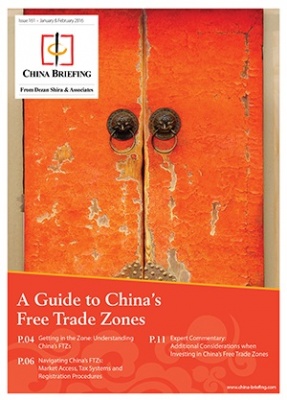
A Guide to China's Free Trade Zones
Published: January 2016In this issue of China Briefing magazine, we examine China’s four Free Trade Zones and discuss the differences and strengths that exist in each of them. We begin by providing an introduction to the FTZs, and then take an in-depth look at the market access conditions, registration procedures and tax environments of each. Finally, we highlight some of the key considerations that foreign companies should be aware of when choosing an FTZ to invest in.
No. of Pages: 14 pages
In this issue:
- Getting in the Zone: Understanding China’s FTZs
- Navigating China’s FTZs: Market Access, Tax Systems and Registration Procedures
- Expert Commentary: Additional Considerations when Investing in China’s Free Trade Zones
The speed of change in China has continued at breakneck pace over the past year. At the beginning of 2015, three new Free Trade Zones (FTZs) had been announced in the country. As 2016 gets underway, FTZs in Tianjin, Guangdong and Fujian have all become fully operational, and the already existing Shanghai FTZ has been greatly expanded.
With Shanghai the nation’s de facto financial center and Guangdong, Tianjin and Fujian key manufacturing, shipping and trading hubs, China’s FTZs have understandably caught the attention of foreign investors seeking to enter a more liberalized Chinese market. The new zones provide fresh and unique opportunities at a time when China is facing ever greater competition from some of its neighbors, and form part of the government’s goal to spur investment outside of the well-established Yangtze River Delta region.
In this issue of China Briefing magazine, we examine China’s four Free Trade Zones and discuss the differences and strengths that exist in each of them. We begin by providing an introduction to the FTZs, and then take an in-depth look at the market access conditions, registration procedures and tax environments of each. Finally, we highlight some of the key considerations that foreign companies should be aware of when choosing an FTZ to invest in.
Regardless of whether you’re an SME seeking to outsource manufacturing costs, a financial leasing company, or a retailer looking to sell to the Chinese market, the FTZs offer incentives that can benefit you. With our experience of setting up companies in each, Dezan Shira & Associates can be your guide to investing in China’s Free Trade Zones.

